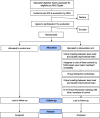A cluster randomised controlled trial, process and economic evaluation of quality improvement collaboratives aligned to a national audit to improve the care for people with diabetes (EQUIPD): study protocol
- PMID: 37653413
- PMCID: PMC10470130
- DOI: 10.1186/s13012-023-01293-0
A cluster randomised controlled trial, process and economic evaluation of quality improvement collaboratives aligned to a national audit to improve the care for people with diabetes (EQUIPD): study protocol
Abstract
Background: People with type 1 diabetes and raised glucose levels are at greater risk of retinopathy, nephropathy, neuropathy, cardiovascular disease, sexual health problems and foot disease. The UK National Institute for Health and Care Excellence (NICE) recommends continuous subcutaneous 'insulin pump' therapy for people with type 1 diabetes whose HbA1c is above 69 mmol/mol. Insulin pump use can improve quality of life, cut cardiovascular risk and increase treatment satisfaction. About 90,000 people in England and Wales meet NICE criteria for insulin pumps but do not use one. Insulin pump use also varies markedly by deprivation, ethnicity, sex and location. Increasing insulin pump use is a key improvement priority. Audit and feedback is a common but variably effective intervention. Limited capabilities of healthcare providers to mount effective responses to feedback from national audits, such as the National Diabetes Audit (NDA), undermines efforts to improve care. We have co-developed a theoretically and empirically informed quality improvement collaborative (QIC) to strengthen local responses to feedback with patients and carers, national audits and healthcare providers. We will evaluate whether the QIC improves the uptake of insulin pumps following NDA feedback.
Methods: We will undertake an efficient cluster randomised trial using routine data. The QIC will be delivered alongside the NDA to specialist diabetes teams in England and Wales. Our primary outcome will be the proportion of people with type 1 diabetes and an HbA1c above 69 mmol/mol who start and continue insulin pump use during the 18-month intervention period. Secondary outcomes will assess change in glucose control and duration of pump use. Subgroup analyses will explore impacts upon inequalities by ethnicity, sex, age and deprivation. A theory-informed process evaluation will explore diabetes specialist teams' engagement, implementation, fidelity and tailoring through observations, interviews, surveys and documentary analysis. An economic evaluation will micro-cost the QIC, estimate cost-effectiveness of NDA feedback with QIC and estimate the budget impact of NHS-wide QIC roll out.
Discussion: Our study responds to a need for more head-to-head trials of different ways of reinforcing feedback delivery. Our findings will have implications for other large-scale audit and feedback programmes.
Trial registration: ISRCTN82176651 Registered 18 October 2022.
Keywords: Audit and feedback; Diabetes; Insulin pump; Quality Improvement Collaborative; Randomised controlled trial.
© 2023. BioMed Central Ltd., part of Springer Nature.
Conflict of interest statement
MS, BY and AB all receive funding from NHS England to deliver the NDA and/or Quality Improvement Collaborative. They will not be involved in trial data extraction or analysis. The remaining authors declare that they have no competing interests.
Figures
References
-
- National Diabetes Audit . Insulin pump audit 2017–18. Leeds: NHS Digital; 2019.
-
- National Institute for health and Care Excellence. Continuous subcutaneous insulin infusion for the treatment of diabetes mellitus Technology appraisal guidance [TA151]. 2008. Available at: https://www.nice.org.uk/guidance/ta151
-
- Steineck I, Cederholm J, Eliasson B, Rawshani A, Eeg-Olofsson K, Svensson AM, Zethelius B, Avdic T, Landin-Olsson M, Jendle J, Gudbjörnsdóttir S. Insulin pump therapy, multiple daily injections, and cardiovascular mortality in 18 168 people with type 1 diabetes: observational study. BMJ. 2015;350. - PMC - PubMed
-
- Hussain T, Akle M, Nagelkerke N, Deeb A. Comparative study on treatment satisfaction and health perception in children and adolescents with type 1 diabetes mellitus on multiple daily injection of insulin, insulin pump and sensor-augmented pump therapy. SAGE Open Med. 2017;5:2050312117694938. doi: 10.1177/2050312117694938. - DOI - PMC - PubMed
Publication types
MeSH terms
Substances
Associated data
Grants and funding
LinkOut - more resources
Full Text Sources
Medical



